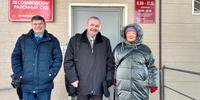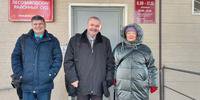The Case of Grinenko and Others in Lesozavodsk
Filter
- #
At 06:10 a.m., Major of Justice O. V. Belyakova, investigator for particularly important cases of the Investigative Directorate of the Investigative Committee of the Russian Federation for the city of Lesozavodsk, Investigative Directorate of the Investigative Committee of the Russian Federation for the Primorsky Territory, initiates a criminal case against Yevgeniy Grinenko under Part 1 of Article 282.2 of the Criminal Code of the Russian Federation.
Employees of the Investigative Committee of the Russian Federation, with the support of the Border Department of the Federal Security Service of Russia in Primorye Territory, are conducting searches in the homes of local believers: Sergey Kobelev, Galina Kobeleva and Yevgeniy Grinenko, who lives with elderly parents.
At 8 o'clock in the morning, under the pretext of checking self-isolation, law enforcement officers, accompanied by investigator A. I. Katsur, invade the family of Sergey Kobelev. At the same time, the head of the family is detained at work and taken home. The security forces seize bank cards of all family members, electronic equipment, letters with friendly correspondence, greeting cards, Bibles in various translations, as well as devices that are not storage media: keyboard, computer mice, webcam, printer, audio speakers, router and even wires. Sergey's wife and child are experiencing great stress, which is aggravated by the fact that in the midst of the epidemic, one of the witnesses has a cough, and personal protective equipment is not used properly - during the six hours of the search, the masks have never been changed. After the search, Kobelev was taken away for interrogation. He was released after 11 hours of detention.
Yevgeniy Grinenko is detained after a search and interrogation.
In total, law enforcement officers interrogate 7 people. The questions of investigators I. S. Bakhtalova, A. V. Belyakova and A. I. Katsura revolve around the religion of Yevgeny Grinenko. Officials threaten believers with arrest. One of the police officers defiantly shows his gun. One of the elderly believers later admits that she experienced "a state of shock, horror, then despondency and anxiety about future interrogations; also a state of instability, unwillingness to return home, where strangers with unfriendly motives were in charge.
- #
Employees of the Investigative Committee of the Russian Federation interrogate 4 local believers.
- #
Judge of the Lesozavodsky District Court Andrey Gusev, in agreement with the prosecutor A. A. Martirosyan, chooses a measure of restraint in the form of detention against Yevgeny Grinenko - until July 12, 2020. It is known that a criminal case was initiated against this peaceful believer under the article "organization of the activities of an extremist organization" (part 1 of article 282.2 of the Criminal Code of the Russian Federation). Before his arrest, he lived in the city of Lesozavodsk with his elderly parents.
- #
- #
Law enforcement officers are conducting searches in 3 more dwellings of peaceful believers. The basis for this is the testimony of FSB officer Vladislav Yuryevich Mrachko, who previously portrayed an interest in the Bible.
- #
In the morning, a search is carried out at another address. On the same day, Yevgeniy Grinenko was formally charged.
- #
Judge of the Primorsky Regional Court E. Valkova refuses to satisfy Yevgeny Grinenko's appeal and leaves him in custody.
- #
It becomes known that Yevgeny Grinenko was transferred to pre-trial detention center No. 4 in the Primorsky Territory, located at the Stary Klyuch station of the Spassky district.
- #
The court decides to change Yevgeniy Grinenko's measure of restraint in the form of detention to house arrest. The total period of stay in the pre-trial detention center was 58 days. During this time, Yevgeny's health deteriorated.
- #
Judge of the Lesozavodsky City Court Maxim Ponomarev, at the request of investigator O. V. Belyakova, changes the measure of restraint for Yevgeny Grinenko from house arrest to a ban on certain actions. Yevgeniy spent 7 months under house arrest.
- #
A criminal case is being opened against 45-year-old Sergey Kobelev and his 65-year-old mother Galina under Part 1.1 (recruitment) and Part 2 (participation in the activities of an extremist organization) of Article 282.2 of the Criminal Code of the Russian Federation.
- #
Galina and Sergey Kobelev are summoned for interrogation. They choose a measure of restraint in the form of a written undertaking not to leave.
- #
Sergey and Galina Kobelev are included in the Rosfinmonitoring list.
- #
Oksana Belyakova, head of the Lesozavodsk District Department, is re-indicting Yevgeny Grinenko under Part 1 of Article 282.2 of the Criminal Code of the Russian Federation.
She also involves 70-year-old Svetlana Efremova as an accused. The woman is accused of committing a crime under Part 2 of Article 282.2 of the Criminal Code of the Russian Federation (participation in the activities of an extremist organization). Sergey Kobelev is officially charged under Part 1.1. and Part 2 of Article 282.2 of the Criminal Code of the Russian Federation.
- #
It turns out that Svetlana Efremova was included in the Rosfinmonitoring list.
- #
The investigator acquits Sergey Kobelev of the charge under Part 1.1 of Article 282.2 of the Criminal Code of the Russian Federation.
- #
Sergey Kobelev is charged under Part 1 of Article 282.2 of the Criminal Code of the Russian Federation.
- #
The case against Galina Kobeleva is being separated into a separate proceeding in connection with the serious illness of a 65-year-old believer.
- #
The case of Yevgeniy Grinenko, Sergey Kobelev and Svetlana Efremova is submitted to the Lesozavodsky District Court of the Primorsky Territory.
- #
Hearings on the merits of the case begin. The state prosecutor is E. Palagina.
After the announcement of the charges, Kobelev, Grinenko and Efremova speak with an attitude towards him. Prosecution witness Vladislav Mrachko, an embedded FSB agent, is being interrogated.
- #
Witnesses are being questioned. When the written testimony of one woman is announced, falsification is revealed. According to the witness, only two sheets of the signature were made by her hand, and the rest were forged. In this regard, the woman refuses to testify at the preliminary investigation.
- #
The court is interrogating a prosecution witness, FSB operative Alexei Savelyev, who organized the operational-search activities. He says that in March 2018, Galina Kobeleva invited a certain Vladislav Mrachko (who turned out to be an FSB officer) to discuss biblical teachings. Realizing that he had one of Jehovah's Witnesses in front of him, he agreed and began to attend divine services. Savelyev provided Mrachko with technical means for video recordings.
According to Savelyev, Yevgeny Grinenko's organizational functions included the following: "he started the meeting, gave the floor to those present, named the topic for discussion, prayed."
The witness denies that believers have any manifestations of enmity or hatred towards other people based on race or nationality; intention to overthrow the government. He also confirms that the essence of the services was reduced to a discussion of "topics of a religious nature." He finds it difficult to name them.
The court is questioning five retired women who know the defendants and attended Jehovah's Witnesses services in Lesozavodsk before 2017. They inform the court that at these meetings the believers discussed biblical teachings, the presence was voluntary, they never heard extremist calls. One of the witnesses mentions that the knowledge she received at the services helped her to improve her relationship with her husband, improve her personal qualities and get rid of bad habits.
Due to discrepancies in the testimonies given in court and during the investigation, the prosecutor reads out the protocols of the interrogations of most of the witnesses. One of the women states that she did not give most of the testimony she read. She also says that the interrogation took place without a lawyer, and due to stress, she signed the protocol without reading it.
- #
Prosecution witnesses are being questioned. One of them, when asked by the prosecutor whether the defendants are Jehovah's Witnesses, replies that she has never seen documents indicating that they are members of this religious organization. She explains that she knows that the defendants believe in God, but the question of religion is a personal matter that she has not discussed with these people. The woman says that a few years ago she attended worship services at the local house of culture, the theme of which was a discussion of the Bible. According to her, talking to people about their religious views is not prohibited by the Constitution of the Russian Federation.
Another woman explains that she met the defendants at friendly meetings that took place about 12 years ago. She explains that they discussed the Bible, sang songs; There were no statements that would incite hostility towards other persons, hatred towards representatives of other nationalities or representatives of the authorities.
- #
Witness Elena Nesterenko, who participated in operational activities, is being interrogated. She tells the court that in 2020 she talked several times with two women on biblical topics, which she later reported to a friend of the criminal investigation officer of the Ministry of Internal Affairs of Russia in Lesozavodsk. After that, video equipment was installed in her apartment, recording everything that happened, and the recording of the conversations was transferred to the investigating authorities. In her written testimony, the witness indicated that the defendant Kobelev had also come to her, but on identification she realized that it was not him.
The witness also says that she once attended a worship service of Jehovah's Witnesses with her daughter and that this was her voluntary desire. Believers read psalms and sang songs. Earlier in her testimony, she noted that the defendant Kobelev held a leading position. At the trial, she explains that his leadership was that he brought a laptop and "switched" something there, and also "said what songs should be sung, what should be read, monitored the operation of the equipment."
When asked whether anything forbidden happened at the meeting, the witness answers in the negative. She says there have been no calls for violence or overthrow, and that Jehovah's Witnesses "are not allowed to take up arms by faith." The witness also confirms that she was not offered to join the organization, make a monetary contribution or make a donation.
The defense claims contradictions in the testimony of the witness at the hearing and during the preliminary investigation.
- #
The court continues to consider the evidence. Witness Vladimir Nesterenko is being interrogated. When asked if he is familiar with the defendant, he replies that a certain Sergey came to his house a couple of times, told something, but does not remember what exactly the conversation was about. Among the defendants present in the courtroom, he could not accurately identify Sergei. He also reports that some women came to his wife and talked to her about Bible topics.
When asked by the defense whether Jehovah's Witnesses, communicating with him and his wife, called for the overthrow of state power, to show hatred towards persons of another nationality and another race, the witness replies that this did not happen.
The court shall grant the request for the disclosure of the testimony of the said witness in connection with a significant contradiction with the testimony given by him during the preliminary investigation.
The testimony of Vladimir Nesterenko dated June 26, 2021, which the witness cannot confirm, explaining that he does not remember anything, is read out.
- #
The court interrogates the witness Glebova. She reports that she knows Evgeny Grinenko and Svetlana Efremova, who has been a friend of her mother for more than 20 years.
The woman says that she had previously attended services of Jehovah's Witnesses in Vladivostok. The last time I attended one of them was in 2000. The witness explains that only biblical topics were discussed at the services, she never witnessed anyone being forced to attend these meetings, participate in them, or talk about God with other people.
Glebova does not know the essence of the charges brought against the defendants, as well as what exactly was prohibited by the decision of the Supreme Court of the Russian Federation in 2017.
- #
The affidavit of the deceased prosecution witness shall be read.
At the request of the prosecutor, they begin to read out written evidence from the volumes of the case, including the protocol of the confrontation of the embedded FSB agent Vladislav Mrachko and Galina Kobeleva. The affidavit of the deceased prosecution witness shall be read.
- #
Experts Nadezhda Oleshkevich, Associate Professor of the Department of Philosophy, and Maria Serdyuk, Doctor of Historical Sciences, are being interrogated via video link.
The prosecutor shall provide the court with all written evidence.
- #
Yevgeny Grinenko's lawyer is filing a motion to exclude a number of materials from the case.
- #
The prosecutor is requesting suspended sentences for all defendants: Yevgeniy Grinenko and Sergey Kobelev for 6 years with a five-year probationary period, and Svetlana Efremova for 3 years with a two-year probationary period. The state prosecutor also asked the court to impose a restriction of freedom: Grinenko for a year and a half, and the rest for a year.
- #
The defendants make their final statements. They explain to the court that they have nothing to do with extremism.
The last word of the defendant Sergey Kobelev in Lesozavodsk The last word of the defendant Svetlana Efremova in Lesozavodsk The last word of the defendant Yevgeniy Grinenko in Lesozavodsk - #
- #



